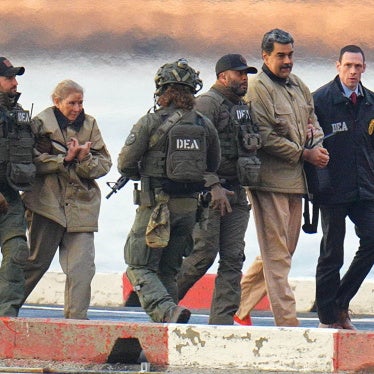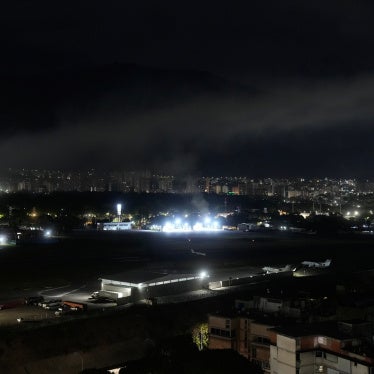While Latin American foreign ministers meet in Chile this week to discuss the situation in Venezuela, Leopoldo López, one of the most prominent leaders of the Venezuelan political opposition, is detained in a military prison waiting for a provisional judge (with no security of tenure) to decide whether he will be put on trial, even though authorities have yet to present credible evidence against him.
The violence in the wake of student and opposition demonstrations that began on February 12 in Venezuela has left a toll of more than 20 people dead, dozens injured, hundreds arrested and serious allegations of brutality, torture, and abuse committed by security forces. The government has also tolerated and collaborated with pro-government armed groups of civilians. The Attorney General's Office, thanks to videos and pressure by public opinion, has taken some steps to investigate those responsible for these incidents. However, efforts to attribute criminal responsibility for the violence to the political opposition have advanced at remarkable speed.
High-level government officials argued that López, leader of the opposition party Voluntad Popular, was the "intellectual author" of the violence, and the Attorney General's Office requested his arrest, accusing him of being responsible for the violence, deaths, and injuries. Days later, they also accused Carlos Vecchio, who worked with López in Voluntad Popular, and two others on similar grounds, invoking conspiracy theories instead of presenting incriminating evidence.
The Venezuelan government finds it relatively easy to use the judiciary as a political tool since, in 2004, former President Hugo Chavez and his supporters in the National Assembly carried out a political takeover of the Supreme Court of Justice, purging several of its members and appointing supporters to the highest tribunal. Since then, the judiciary has largely ceased to function as an independent branch of government. Through the Judicial Commission of the Supreme Court, which has the power to appoint and remove provisional and temporary lower court judges (who are now the majority of judges in the country), his politicization of the justice system has extended to the entire judiciary.
On February 18, López turned himself over to authorities, and has since then been detained in the Ramo Verde military prison, where he is only allowed to see his immediate family members and his attorneys, and only leaves his cell when he can get some fresh air without being in contact with other prisoners.
After the Venezuelan newspaper Últimas Noticias published evidence that suggests that uniformed officers together with armed men in plainclothes were responsible for one of the deaths on February 12, the Attorney General's Office was forced to backtrack and dropped the charges of homicide initially included in López's arrest warrant. However, López remains under investigation for various crimes, including conspiracy, which carries a possible sentence of up to 10 years.
It is highly unlikely that López will be released any time soon. Legally, he may be preventively detained for up to 45 days, when the prosecutor should charge him, archive the case until further evidence is obtained, or determine there is no evidence to move forward with the prosecution. But in practice these deadlines are rarely respected in Venezuela.
Under the rule of law, López's liberty should be guaranteed if authorities do not present credible evidence linking him to the commission of a crime. However, in Venezuela it is very difficult for a judge to make a lawful decision if it goes against government interests.
For example, in 2009, judicial authorities arbitrarily arrested Judge Maria Lourdes Afiuni for complying with a United Nations’ recommendation and granting the conditional release of an opponent of the Chavez administration. Afiuni, a judge with security of tenure, spent a year in prison, two years under house arrest, and remains subject to criminal prosecution for crimes she did not commit. Before the Afiuni case, judges feared losing their jobs if they made decisions contrary to the interests of the government. Now they also fear being thrown in jail.
In a country where the judiciary lacks independence, Leopoldo López's future is in the hands of a judge who could be removed by a telegram without any explanation, as it has routinely occurred in the past. The decision on the future of the judge, in turn, is in the hands of judges of the Supreme Court, a body that has routinely upheld government policies.
The OAS meeting held last week behind closed doors ended with a statement that seems to describe the situation in Venezuela as a natural disaster, instead of holding the Venezuelan government responsible for human rights violations such as censorship and brutality of security forces. Is there any chance that the meeting in Santiago will lead to a different result, requiring Venezuela to uphold its international legal obligations to respect human rights? Specifically, could governments, this time, ask Venezuela to end abuses against demonstrators and ensure the release and respect for due process guarantees of those who were arbitrarily detained, such as Leopoldo López?
José Miguel Vivanco is the Americas executive director at Human Rights Watch.








